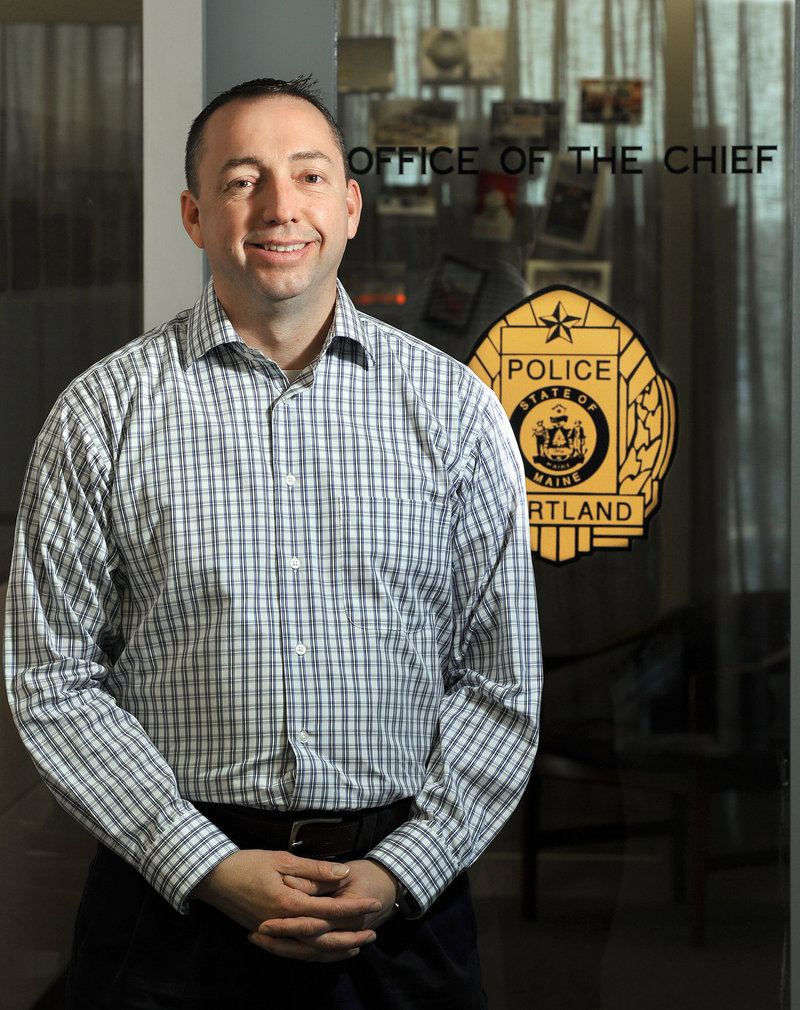PORTLAND – Police Chief Michael Sauschuck returned last week from the FBI National Academy in Quantico, Va., where he produced about 20 research papers and presentations — and developed a new appreciation for diet and exercise.
FBI trainers said a chronic problem among police departments, like many businesses, is that the boss doesn’t get enough exercise and doesn’t eat right.
“They said (that) ‘if you can’t find 20 minutes out of your day, then you need to re-prioritize,'” Sauschuck said in an interview Monday.
He said the right diet and exercise are important for police commanders, and to set a tone in the department.
“I’ve got to lead from the front in all categories. If I’m out of shape, I can’t expect my officers to be (fit),” he said.
Sauschuck, 42, went through 11 weeks of law enforcement executive school, a block of classes offered by the FBI four times a year to train future and current police executives on the latest techniques for running an effective department.
The fall class included officers from every state and 29 countries, from the rank of sergeant up to chief, he said.
Some had been on the waiting list for decades, Sauschuck said.
He had been waiting for two years when Chief James Craig left Portland last year, and the departure delayed Sauschuck’s enrollment.
Sauschuck took courses on conflict management, labor relations and managing organizational change, all of which are important to running a department that serves its community well, he said.
Police work is more than a gun, a nightstick and a book of law.
“We are professional communicators,” he said, noting that the Indiana Police Academy has as its motto: Reader, writer, thinker, fighter. “And it’s in that order for a reason.”
Sauschuck said that for a department to stay on the cutting edge, managing change and introducing new concepts must be done well.
He was one of nine officers selected to attend the department’s — and the state’s — first crisis intervention training program.
Those officers helped to build a philosophy within the department to employ de-escalation strategies with people in mental health crisis.
A similar effort incorporated verbal judo — a way to calm potentially combative people — as a standard department procedure.
One of Sauschuck’s classes did get into the nitty-gritty of police work and the policies and strategy that guide it.
A course on firearms and arson investigations started with some basics of investigative techniques and included sections on the cutting-edge science that’s available to officers.
That’s important information to have for writing policy or evaluating the department’s performance.
Sauschuck said he spoke with other police leaders who had been through the training. Portland police Lt. Janine Roberts is a graduate of the program, for example.
Sauschuck said all 256 members of the fall class were enrolled in the physical fitness component, which included course work on nutrition and health, as well as daily workouts that culminated with a six-mile obstacle course used by the Marine Corps, called the “Yellow Brick Road.”
For Sauschuck, who served in the Marines before becoming a police officer, it was similar to when he trained in Quantico as a young Marine.
This time, however, the course was designed to better protect the trainees.
“They had these mattresses and stuff,” he said. “They don’t want you to fall down and get hurt.”
Staff Writer David Hench can be contacted at 791-6327 or at:
dhench@pressherald.com
Send questions/comments to the editors.



Success. Please wait for the page to reload. If the page does not reload within 5 seconds, please refresh the page.
Enter your email and password to access comments.
Hi, to comment on stories you must . This profile is in addition to your subscription and website login.
Already have a commenting profile? .
Invalid username/password.
Please check your email to confirm and complete your registration.
Only subscribers are eligible to post comments. Please subscribe or login first for digital access. Here’s why.
Use the form below to reset your password. When you've submitted your account email, we will send an email with a reset code.